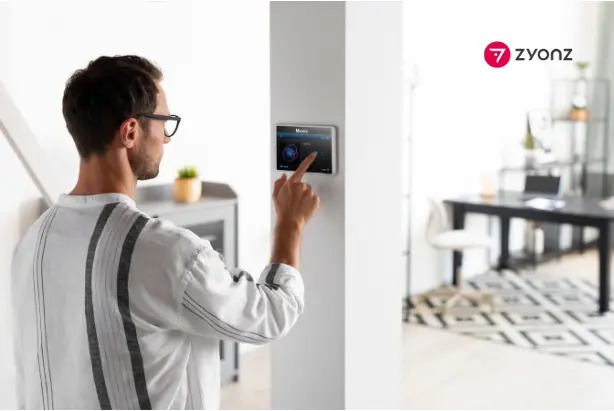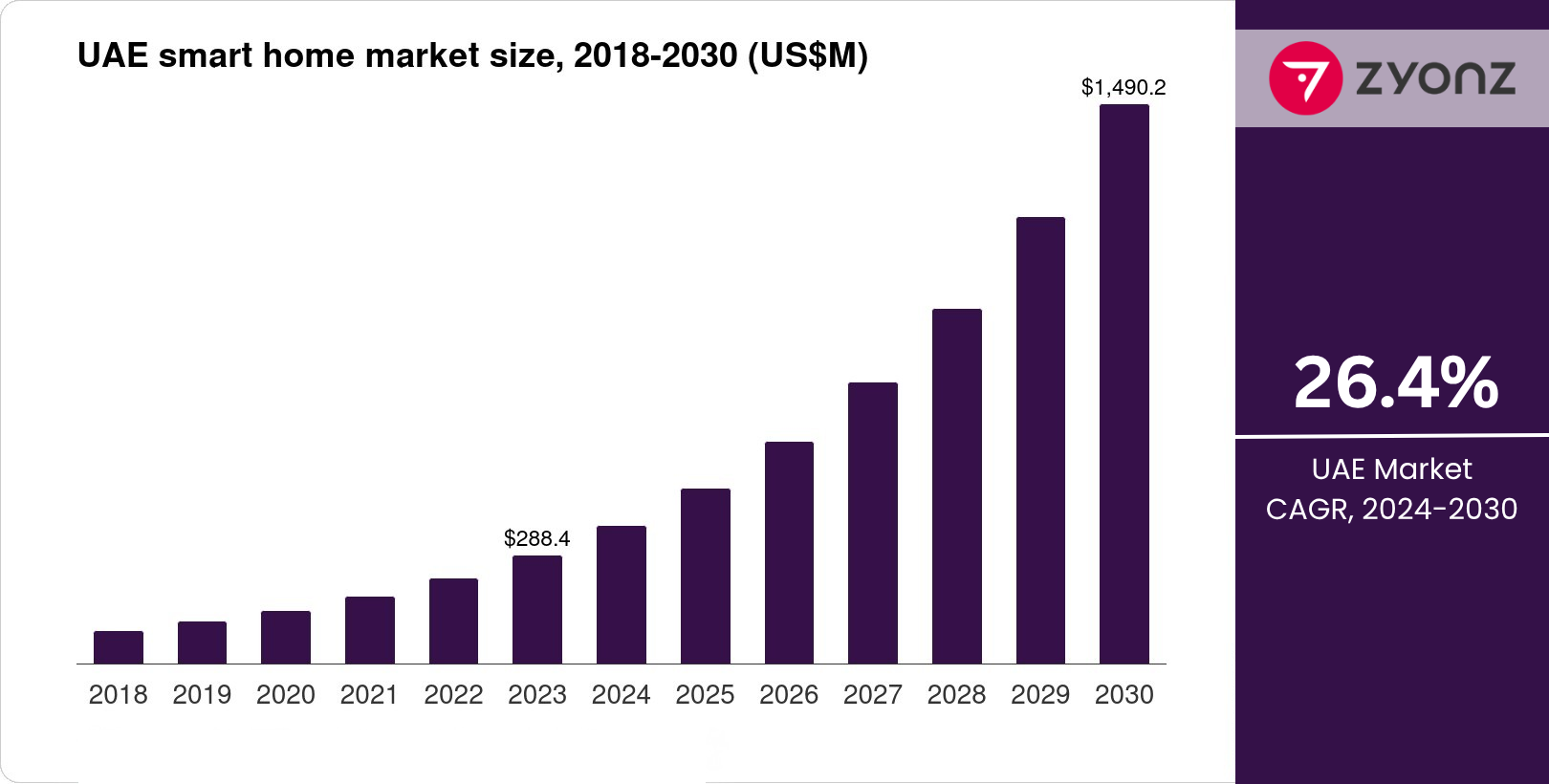- An ISO Certified Company
Smart Sensors for UAE Homes: Enhance Comfort, Safety & Efficiency

Smart technology isn’t just a trend in the UAE—it’s now transforming daily home life. As more Dubai and Abu Dhabi residents look to improve home comfort, boost security, and reduce utility bills, smart sensors are rapidly becoming the centerpiece of this movement. According to recent market forecasts, the UAE Smart Home market is witnessing double-digit growth thanks to proactive government policies, a tech-savvy population, and ambitious smart city projects. As of 2025, the household penetration rate for certain smart home devices is climbing steadily, with more than 13% of homes in the UAE now using at least one connected device for comfort, security, or energy management. This surge reflects both changing lifestyles and the increasing affordability and accessibility of modern technology.
Smart sensors lie at the very core of the UAE’s smart home revolution. Their ability to automate tasks, monitor conditions, and keep residents safe is helping homeowners create living environments perfectly adapted to the region’s unique needs. For anyone curious about future-proofing life in the Emirates, understanding and investing in these smart tools is fast becoming a must.
Why Smart Sensors Matter in UAE Homes
The UAE’s distinctive climate, high energy costs, and ambitious vision for smart living make smart sensors essential for modern households. Triple-digit summer temperatures, rapid population growth, and a high proportion of time spent indoors all fuel demand for solutions that boost efficiency and safety. The UAE smart home market is expected to grow at a CAGR of more than 17% through 2025, led by strong demand in Dubai and Abu Dhabi.
Several key factors reinforce the relevance of smart sensors:
-
Climate Extremes: Heat and humidity tax AC systems and increase energy costs. Sensors help manage temperature, optimize AC output, and cut waste.
-
Energy Efficiency: Differential electricity pricing encourages careful monitoring and automated reductions in lighting, cooling, and appliance loads.
-
Safety Needs: Urban high-rises and sprawling villas need robust smoke, gas, and intrusion detection.
-
Smart City Initiatives: Projects such as Dubai Smart City and Expo 2020 leave a legacy of digital adoption, influencing even private residences.
-
IoT Growth: Fast 5G adoption and strong network coverage in the Emirates remove barriers to widespread sensor use, positioning the UAE as a regional innovation leader.
Types of Smart Sensors for UAE Homes
Let’s explore the types of smart sensors best suited to UAE living, using local examples:
-
Motion and Presence Sensors: Perfect for automating lights, alerting to intruders, or signalling activity in unoccupied rooms—great for large villas and security-conscious city dwellers.
-
Temperature and Humidity Sensors: Help optimize AC settings, preventing overcooling and maintaining comfort while saving on utility bills—a must in Dubai’s scorching summers and humid coastal zones.
-
Gas and Smoke Detectors: Life-saving technology for kitchens, service rooms, or anywhere with gas lines. These devices send real-time alerts and can trigger ventilation or auto-shutdowns, supporting strict UAE safety codes.
-
Water Leak Sensors: Indispensable for both apartments and villas. Undetected leaks, common in high-rise plumbing or garden irrigation, can cause massive damage and waste—a serious issue for eco-focused homeowners.
-
Air Quality Sensors: Monitor dust, particulates, and VOCs—vital in a country regularly affected by sandstorms. In Abu Dhabi and Dubai, indoor air quality is just as critical as temperature.
Leading vendors in Dubai and Abu Dhabi now offer packages tailored to these priorities, ensuring local compatibility and responsive support.
Benefits of Smart Sensors in UAE Homes
The advantages of using smart sensors in Emirates residences are game-changing:
-
Significant Energy Savings: With intelligent automation, smart home sensors UAE homeowners can slash cooling and lighting costs. Automatic adjustment relieves AC pressure during peak summer and ensures lights are never on when not needed.
-
Enhanced Safety and Real-Time Alerts: Sensors instantly detect gas leaks, smoke, or unusual water usage, sending alerts via smartphone or panel. This can prevent costly disasters or even save lives.
-
Lifestyle Convenience: Smart sensors integrate with popular voice assistants—most now supporting both English and Arabic—so you can control climate, security, or entertainment hands-free.
-
Future-Proofing: With the UAE’s focus on sustainable, smart living, a connected sensor ecosystem adds value for today and tomorrow.
-
Growing Ecosystems: UAE homeowners are increasingly investing in complete smart home systems, integrating lighting, AC, security, and more for seamless, app-based control.
Buying & Installation Tips for UAE Homeowners
For a smooth upgrade to a smart home, UAE homeowners should:
-
Verify Compatibility: Make sure sensors work with your chosen platform (Alexa, Google Home, or Apple HomeKit), and check for Arabic language support if needed.
-
Network Stability: Reliable Wi-Fi is essential, but Zigbee and other wireless protocols offer better stability for busy networks, especially in larger homes.
-
Choose Vendors with Local Support: Buy from trusted, UAE-based vendors who offer installation, warranty, and ongoing support for Dubai and Abu Dhabi customers.
-
Wired vs Wireless: Apartments often benefit from wireless sensors (quicker, less messy to install), while new-build villas may integrate wired options for added reliability.
-
Trusted Companies: ZYONZ, for example, is widely recognized for providing reliable smart sensor solutions and responsive after-sales service to UAE homeowners.
Latest Trends in Smart Sensor Technology (2025 and Beyond)
Advanced technologies are reshaping home automation in the UAE even further:
-
AI-Driven Automation: Artificial intelligence predicts temperature patterns, learns routines, and manages devices for maximum comfort with minimal input.
-
Edge Computing: Sensors with onboard intelligence make fast, secure decisions locally, reducing lag and risk.
-
IoT and Smart City Integration: UAE homeowners can expect deeper links between home sensors and broader city infrastructure, including energy grids and city-wide alerts.
-
Sustainability: Eco-focused sensors help track resource use, reduce waste, and align with government carbon-reduction goals.
Dubai and Abu Dhabi smart city initiatives continue to spur partnerships between sensor vendors, real estate developers, and municipal authorities for innovative, future-ready living.
Step-by-Step Setup Guide for Installing Smart Sensors
Ready to transform your living space? Here’s a clear, expert-backed plan:
-
Audit Home Areas: Identify key spaces—kitchen, living room, entryways—where sensors are most needed.
-
Choose Your Ecosystem: Compare Google Home, Alexa, and Apple HomeKit for compatibility with current and future devices.
-
Select and Install Sensors: Start with basics (motion, smoke, leak) and expand. Prioritize local vendors and installers.
-
Integrate Automation: For more advanced solutions, explore professional systems and resources on house automation Dubai.
-
Maintain and Update Regularly: Schedule periodic checks and keep apps/firmware current for performance and security.
Conclusion
Smart Sensors for UAE Homes are more than a convenience—they’re the foundation of safer, more comfortable, and sustainable modern living in Dubai, Abu Dhabi, and beyond. As adoption soars, expert installation and thoughtful integration become critical. Trusted companies like ZYONZ stand ready to help, offering comprehensive solutions tailored to UAE conditions and the evolving expectations of connected homeowners.

